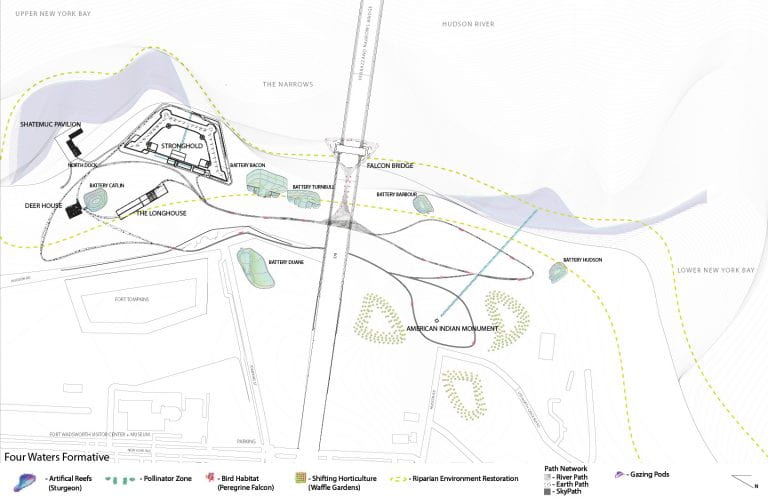Source: https://campuspress.yale.edu/isapd/an-indigenous-approach-to-urban-planning-in-new-york/
Posted on May 11, 2020 by galleanj
For her second year Urban Design Studio taught by Bimal Mendis, Anjelica S. Gallegos (MArch I ’21), focused on restoring the Indigenous knowledge and practices of historical ecological consciousness to select sites. The three sites she worked with were in Fordham Landing, Bronx, and Inwood Hill, Manhattan. Her project entitled, The Nature-Culture Nexus Plan, focused on revealing the unseen inter-dependencies with the natural world, recharging the reciprocal relationship between the collective of people, animals, plants, fungi, ecosystems by reengaging the built environment with the natural environment.
The dependency humans have on the ecological environment has been ubiquitous for time immemorial and yet many natural processes are unacknowledged and often directly contradicted by human activities. For example, pollinators are the agents that release over 80% of the world’s flowering and food plants. Without pollinators humans and all of Earth’s terrestrial ecosystems would not survive.
In New York State between 42% and 68% of managed and commercial bee colonies have died each year since 2010. This phenomenon is coupled with extreme loss in the native pollinator community and the natural habitat that sustains it.
The loss of ecological consciousness stems from the coupled erasure of ecological knowledge and forced displacement of the communities who know these environments thoroughly; the Indigenous communities.
The NATURE-CULTURE NEXUS PLAN is designed to be a framework to sow across both ecosystems and urban places, while recognizing and strengthening the unique histories and current conditions of each site.
The seven step plan includes methodology within Indigenous traditional knowledge covering , cultural resources, responsive landscape technology, site heritage and cross-pollinating programming.
Although Indigenous communities are among the most climate-sensitive groups within the Northwest, Southern, and Eastern regions of the United States because they are heavily dependent on natural resources for cultural identity and economics, they are leading action to engage in climate-change mitigation and adaptation at regional, national, and international levels. Indigenous understanding and action to address climate change are rooted in Indigenous knowledge systems created over centuries that are as diverse as the communities and ecosystems from which they emerge.
Indigenous cultural identity and traditional knowledge stems from a reciprocal relationship with place; the natural environment or site. Traditional knowledge includes ways of knowing culture, experiences, resources, ecology, and animal knowledge gained from both personal experience and from elders in the form of oral histories, stories, ceremonies, and land management practices passed down and adapted from generation to generation.
A return to ecological consciousness and active reciprocity with the natural world is necessary for survival and a healthy and secure future.
Gallegos’ project further proposed collaboration between local, state and federal programs and select policy, including the ConEdison Utility, United States Department of Energy -Office of Indian Energy and more. To see her complete project and manual with step by step methods, see this link.
